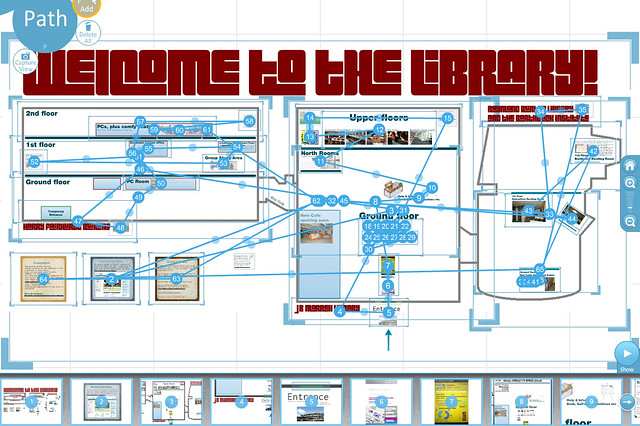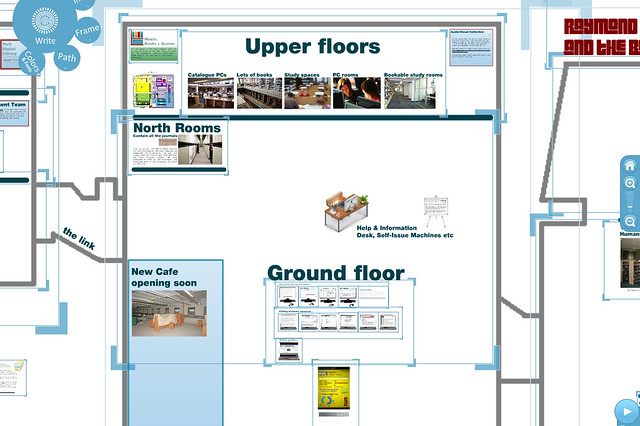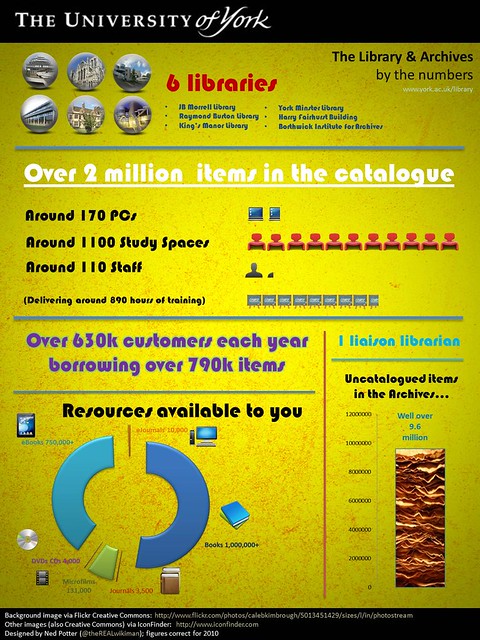I seem to have a different view to a lot of information professionals in that I'm all for spoon-feeding. It's a loaded term - I'm actually all for the process it involves, rather than the philosophy it evokes. Above all, I think libraries are there to provide information and we should do this in as straightforward a manner as possible. Crucially, I think we can spoon-feed the students AND give them the skills they need to ditch the spoon entirely over time.

(There's an on-going debate in academic librarianship about spoon-feeding - should we give students all the help they need and make things as easy as possible, or should we be looking to educate them so they can fend for themselves? For example, providing digitised materials via the VLE - many people object to this, because if the reading is put on a plate for them, how will the students learn to find good quality literature? Etc. Simon Barron wrote a very thoughtful post on the subject yesterday, and linked in the comments are other bloggers' views on the same subject: Jo Alcock, Georgina Hardy and Sian Blake.)
Ideally, though, spoon-feeding should be the first step in a structured approach to helping students navigate their way through a degree, with the library embedded and responsive at all stages. I'm all too aware of where the phrase derives from because I have a 17-month-old daughter (or "17 month-yearold" as I always seem to call her) - we feed her with a spoon. We also give her a spoon of her own so she can feed herself. We're just starting to get rid of the spoon, and let her loose on a fork. The point being, spoon-feeding isn't a directive or a philosophy or an way-of-life, it's a stage - just as it should be with information in education.
She absolutely had to be spoon-fed at first because she couldn't feed herself - it was spoon-feed or no food at all. This is analogous for undergrads, for me - I think we underestimate how stark the change is from school and Further Education to Higher Education, and they have a LOT to adjust to in their first term without the library contributing to their problems as part of some misguided belief that it's for 'their own good'. If possible, we should be digitising all the core readings for undergrad modules, and putting them in the VLE, so that the students definitely get to read what they need to read. This allows them to participate fully in their lectures and seminars, which is more important than their level of information literacy at this stage. I used to run a digitisation service that did this, and the lecturers loved it because it allowed them to teach in the knowledge that EVERYONE had done the reading - without it, there were always people who couldn't get hold of the book in the library in time.
One department had a pedagogical objection to the digitisation programme and didn't use it - they said this wasn't preparing the students for real life because they didn't have to come to the library, learn to use the catalogue, find books on the shelves etc. But of course, real life isn't like that - real life is using Google because in 99% of cases that's perfectly adequate. I liked this quote from Georgina Hardy:
We must be very careful not to value process above principles. Because, let’s face it, the skills of getting good results from a Library Catalogue, remembering to reserve books over a month in advance in order to photocopy a single chapter, and negotiating a complicated, publisher-specific, multi-stage login procedure to access journals from off-campus are skills only useful to those students who wish to go on to become Librarians.
Or, indeed, researchers / academics...
Once students get past the crazyness of their first couple of terms, that's when we can start trying to help them develop the skills to find stuff for themselves. I'm currently looking after English at my institution, and I really like the approach of one of the lecturers - she's requested that the core readings be digitised, but she's got me in to do a workshop (or 7 workshops, actually...) in the second term all about how to find secondary readings, via e-journals, Google Scholar and so on. This is just right, for me - give the students what they need to function, AND teach them how to get stuff for themselves. It doesn't have to be one or the other - spoon-feed whilst teaching them to use the spoon is surely the way forward?
Ideally the library shouldn't be only involved in teaching at the start and the end of the degree. This is often how it works - we do loads of stuff during induction (literally week 1 of their academic lives!) and then get parachuted in at the end to provide much needed aid on the eve of exams or dissertations. Ideally, we'd do some stuff in the 2nd year - guiding their hand as they use the spoon themselves - and again at the start of their 3rd year - getting rid of the spoon and giving them the skills they need to find food for themselves from any number of sources. This 2nd and 3rd year intervention should be based on the level the students have reached, and the needs they have then.
This way, we get to be helpful in the way students actually want (and in the way that will ensure good NSS scores which is, of course, The Only Thing That Matters In HE) and will expect for their 9k a year, and we get to teach them to help themselves in the way they actually need in the long-term. Quite apart from anything else, if the students are getting what they perceive as a good service from us (i.e. we have the provision they need to help them study, so they spend their time studying rather than searching for materials) they'll be more receptive to our instruction about info/digital/all-the-other literacies later.
Spoon-feeding is a useful service to provide, at the beginning of the student lifecycle; we shouldn't eschew it entirely just because we want to teach them to fend for themselves later on.
- thewikiman




